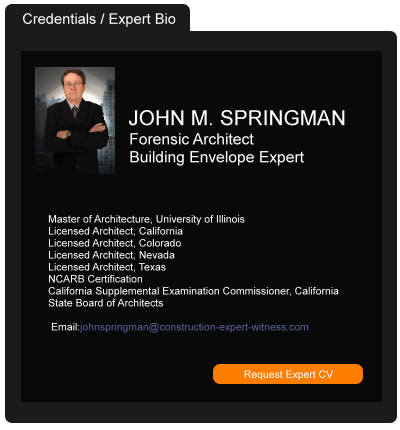U.S. Home Prices Climbed 0.1% in July as Gains Slowed
September 24, 2014 —
Prashant Gopal – BloombergU.S. home prices rose less than economists estimated in July as investors pull back from the property market.
Prices climbed 0.1 percent on a seasonally adjusted basis from June, the Federal Housing Finance Agency said today in a report from Washington. The average economist estimate was for a 0.5 percent increase, according to data compiled by Bloomberg.
Investors who helped drive up prices are retreating as fewer foreclosures and other discounted homes become available. All-cash purchases in August fell to about 23 percent of the market from the usual 33 percent, the National Association of Realtors reported yesterday. Investors accounted for 12 percent, the least since late 2009.
Read the court decisionRead the full story...Reprinted courtesy of
Prashant Gopal, BloombergMr. Gopal may be contacted at
pgopal2@bloomberg.net
Taylor Morrison v. Terracon and the Homeowner Protection Act of 2007
June 11, 2014 —
Buck Mann – Colorado Construction LitigationOn January 30, 2014, the Colorado Court of Appeals decided the case of Taylor Morrison of Colorado, Inc. v. Bemas Construction, Inc. and Terracon Consultants, Inc. 2014WL323490. The case addressed a substantial issue of Colorado constitutional law, as well as a variety of procedural issues of potential importance to construction litigation attorneys. Of particular interest is the question of whether the provisions of the 2007 Homeowner Protection Act (“HPA”) are limited in application to contracts between residential homeowners and construction professionals, or whether they have broader application between commercial construction professional parties as well. As discussed below, the Court of Appeals stated that it would not answer the question, and then, separately, implied that the statute might only apply to homeowner transactions – with the resulting exclusion of commercial transactions. However, after its analysis, it left the actual decision of that issue to a future court in a later case.
The factual background for the case involved claims of breach of a contract for soils engineering by Terracon Consultants, Inc. (“Terracon”) and negligent excavation work by Bemas Construction, Inc. (“Bemas”). Plaintiff was Taylor Morrison of Colorado (“Taylor Morrison”), the developer and general contractor for a residential subdivision called Homestead Hills. After it constructed many homes, Taylor Morrison began to receive complaints of cracking drywall resulting from foundation movement and it made repairs at significant expense. Taylor Morrison then filed suit against Terracon and Bemas in connection with their respective roles in the original construction.
Read the court decisionRead the full story...Reprinted courtesy of
Buck Mann, Higgins, Hopkins, McLain & Roswell, LLCMr. Mann may be contacted at
mann@hhmrlaw.com
Virtual Jury Trials of Construction Disputes: The Necessary Union of Both Sides of the Brain
May 17, 2021 —
John Dannecker - Construction ExecutiveBart Smith is the Senior Project Manager for Simply Best, a general contracting firm. He has been assigned to serve as the liaison with outside counsel in a lawsuit against Holly’s Harleys, a project owner who contracted with Best for the construction of a motorcycle showroom. Best filed suit in federal court for additional project costs it incurred, which it contends were caused by the specification of incompatible materials by Holly’s design firm.
The coronavirus pandemic is still raging as the trial date approaches. Courthouse facilities are closed so civil trials are conducted using remote technology, if they occur at all. Bart negotiated the prime contract with Holly’s, and he regrettably allowed Best’s binding arbitration and jury trial waiver clauses in the prime contract to be deleted. Bart worries about how the intricacies of Best’s case can be adequately explained to a jury in a remote trial. His concern approaches panic when Best’s trial counsel explains how the trial will be conducted with none of the parties—their attorneys, the judge, the witnesses or the jury—present in the same location.
Reprinted courtesy of
John Dannecker, Construction Executive, a publication of Associated Builders and Contractors. All rights reserved.
Read the court decisionRead the full story...Reprinted courtesy of
Just Decided – New Jersey Supreme Court: Insurers Can Look To Extrinsic Evidence To Deny a Defense
September 05, 2022 —
Randy J. Maniloff - White and Williams LLPLast week, the New Jersey Supreme Court decided Norman International, Inc. v. Admiral Insurance Company, No. 086155 (N.J. Aug. 11, 2022). At issue was coverage for a work-site injury and the interpretation of a policy exclusion for operations or activities performed by an insured in certain counties in New York. The case is significant in terms of addressing causation for purposes of the application of exclusions. But the more wide-reaching issue has nothing to do with the scope of the exclusion.
The real story from Norman is the New Jersey high court’s pronouncement that an insurer, in certain circumstances, can use extrinsic evidence to deny a defense to its insured. New Jersey duty to defend law has been a jungle land and in need of more supreme court guidance.
Read the court decisionRead the full story...Reprinted courtesy of
Randy J. Maniloff, White and Williams LLPMr. Maniloff may be contacted at
maniloffr@whiteandwilliams.com
Where Breach of Contract and Tortious Interference Collide
January 11, 2022 —
Christopher G. Hill - Construction Law MusingsClaims for breach of contract are numerous in the construction law world. Without these claims we construction attorneys would have a hard time keeping the doors open. A 2021 case examined a different sort of claim that could arise (though, “spoiler alert” did not in this case) during the course of a construction project. That type of claim is one for tortious interference with business expectancy.
In Clark Nexsen, Inc. et. al v. Rebkee, the U. S. District Court for the Eastern District of Virginia gave a great explanation of the law of this type of claim in analyzing the following basic facts:
In 2018, Clark Nexsen, Inc. (“Clark”) and MEB General Contractors, Inc. (“MEB”) responded to Henrico County’s (“Henrico”) Request for Proposals (“RFP”) for the design and construction of a sport and convocation center (the “Project”). Henrico initially shortlisted Clark and MEB as a “design-build” team for the Project, but later restarted the search, issuing a second RFP. Clark and MEB submitted a second “design-build” proposal, but Henrico selected Rebkee Co. (“Rebkee”) for certain development aspects of the Project. MEB also submitted proposals to Rebkee, and Rebkee selected MEB as the design-builder for the Project. MEB, at Rebkee’s request, solicited proposals from three design firms and ultimately selected Clark as its design partner. From December 2019 to May 2020, Clark and MEB served as the design-build team to assist Rebkee in developing the Project. In connection therewith, Clark developed proprietary designs, technical drawings, and, with MEB, several cost estimates. In February 2020, MEB submitted a $294,334.50 Pay Application to Rebkee for engineering, design, and Project development work. Rebkee never paid MEB. Henrico paid MEB $50,000.00 as partial payment for MEB’s and Clark’s work. MEB then learned that Rebkee was using Clark’s drawings to solicit design and construction proposals from other companies. On July 23, 2020, Rebkee told MEB that Henrico directed it to cancel the design-build arrangement with MEB and Clark and pursue a different planning method. MEB and Clark sued and Rebkee for, among other claims, tortious interference with a business expectancy. Rebkee moved to dismiss the tortious interference claim.
Read the court decisionRead the full story...Reprinted courtesy of
The Law Office of Christopher G. HillMr. Hill may be contacted at
chrisghill@constructionlawva.com
Collapse of Underground Storage Cave Not Covered
June 29, 2020 —
Tred R. Eyerly - Insurance Law HawaiiThe Eighth Circuit faced unusual facts in determining that the collapse of a cave serving as a storage facility was not covered under the policy. Westchester Surplus Lines Ins. Co. v. Interstate Underground Warehouse & Storage, Inc., 2020 U. S. App. LEXIS 83 8th Cir. Jan. 3, 2020).
Interstate operated an underground storage facility in a cave that formerly housed a limestone mine. In 2014, Interstate experienced a series of "dome-outs," in which layers of rock destabilized, detached, and collapsed from above into the cave.
Interstate's policy with Westchester included coverage for collapse of a "building" caused by "building decay." Westchester sought a declaratory judgment that Interstate's loss was not covered. The district court granted summary judgment for Westchester because the cause of the loss was not "building decay" within the meaning of the primary policy.
Read the court decisionRead the full story...Reprinted courtesy of
Tred R. Eyerly, Damon Key Leong Kupchak HastertMr. Eyerly may be contacted at
te@hawaiilawyer.com
South Carolina Supreme Court Asked Whether Attorney-Client Privilege Waived When Insurer Denies Bad Faith
September 18, 2018 —
Tred R. Eyerly - Insurance Law HawaiiThe Fourth Circuit certified the following question to the South Carolina Supreme Court: Does South Carolina law support application of the "at issue" exception to the attorney-client privilege such that a party may waive the privilege by denying liability in its answer? In Re: Mt. Hawley Ins. Co., 2018 U.S. App. LEXIS 17910 (4th Cir. June 28, 2018).
Mt. Hawley insured Contravest Construction Company under an excess commercial liability policy from July 21, 2003 to July 21, 2007. During this period, Contravest constructed a development in South Carolina. In 2011, the Owners Association sued Contravest for alleged defective construction. Mt. Hawley denied tenders to defend or indemnify. Contravest ultimately settled the case.
Read the court decisionRead the full story...Reprinted courtesy of
Tred R. Eyerly, Damon Key Leong Kupchak HastertMr. Eyerly may be contacted at
te@hawaiilawyer.com
California Contractors: New CSLB Procedure Requires Non-California Corporations to Associate All Officers with Their Contractor’s License
April 19, 2021 —
Amy Pierce, Mark Oertel & John Lubitz - Lewis BrisboisAs of July 1, 2020, “[e]very person who is an officer, member, responsible manager, or director of a corporation or limited liability company seeking licensure under this chapter shall be listed on the application as a member of the personnel of record,” and they must match those officers listed on California Secretary of State’s (SOS) records. (Cal. Bus. & Prof. Code § 7065 (b)(1)). This is a deviation from the Contractors State License Board’s (CSLB) past practice of requiring foreign corporations to associate as personnel of record only their president, in contrast to requiring domestic corporations to associate their president, secretary, and treasurer.
Beware that the CSLB may discover that the licensee’s personnel of record are incomplete or incorrect when reviewing a license renewal application, because it will compare the SOS’s records to the license renewal application. A license renewal application requires the licensee to list its qualifier and personnel of record. If the SOS and CSLB records do not match, this could delay approval of the license renewal application until the missing personnel are added and fingerprinted.
Reprinted courtesy of
Amy Pierce, Lewis Brisbois,
Mark Oertel, Lewis Brisbois and
John Lubitz, Lewis Brisbois
Ms. Pierce may be contacted at Amy.Pierce@lewisbrisbois.com
Mr. Oertel may be contacted at Mark.Oertel@lewisbrisbois.com
Mr. Lubitz may be contacted at John.Lubitz@lewisbrisbois.com
Read the court decisionRead the full story...Reprinted courtesy of


































































